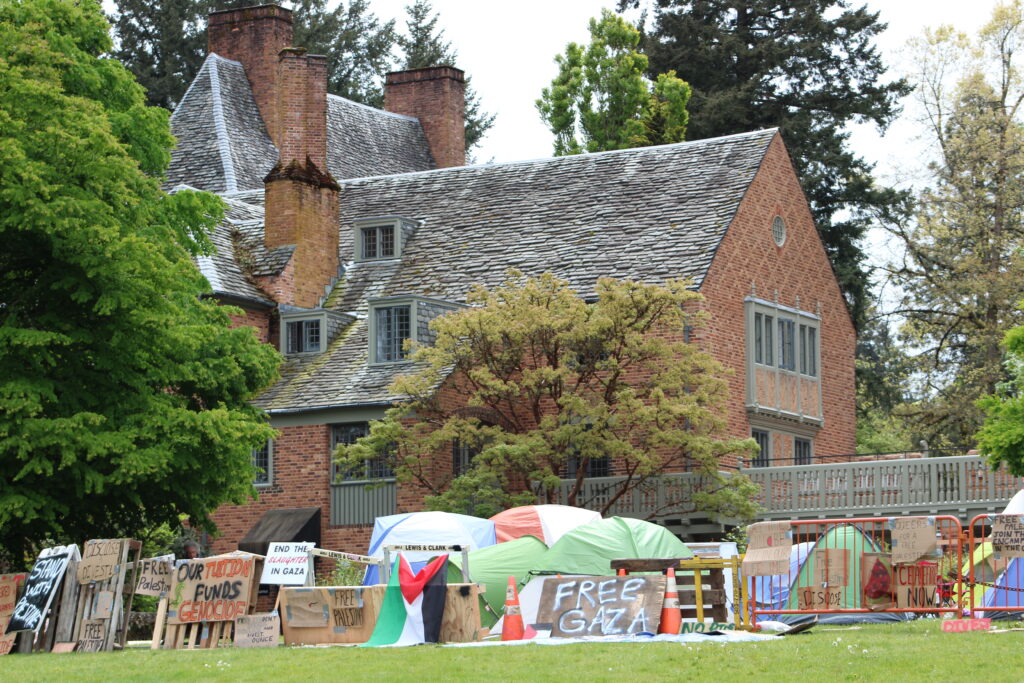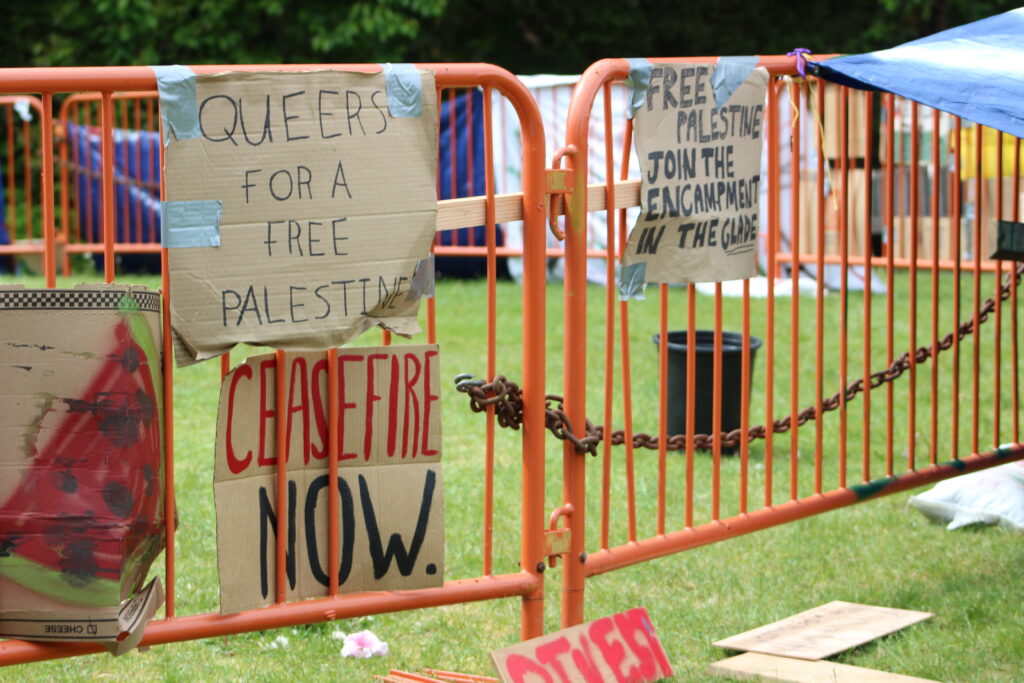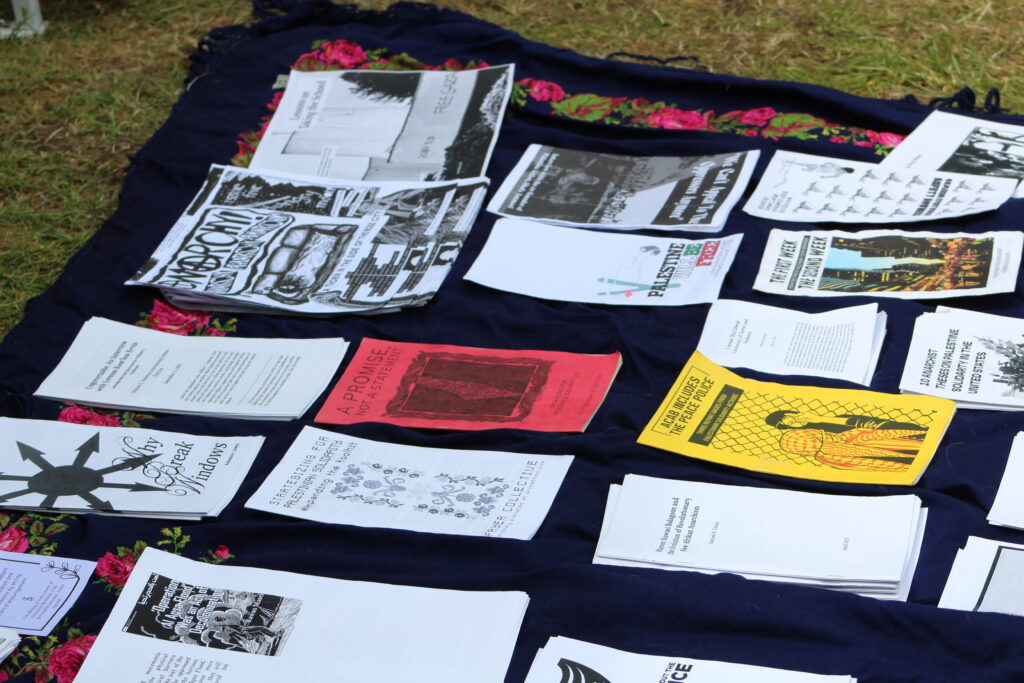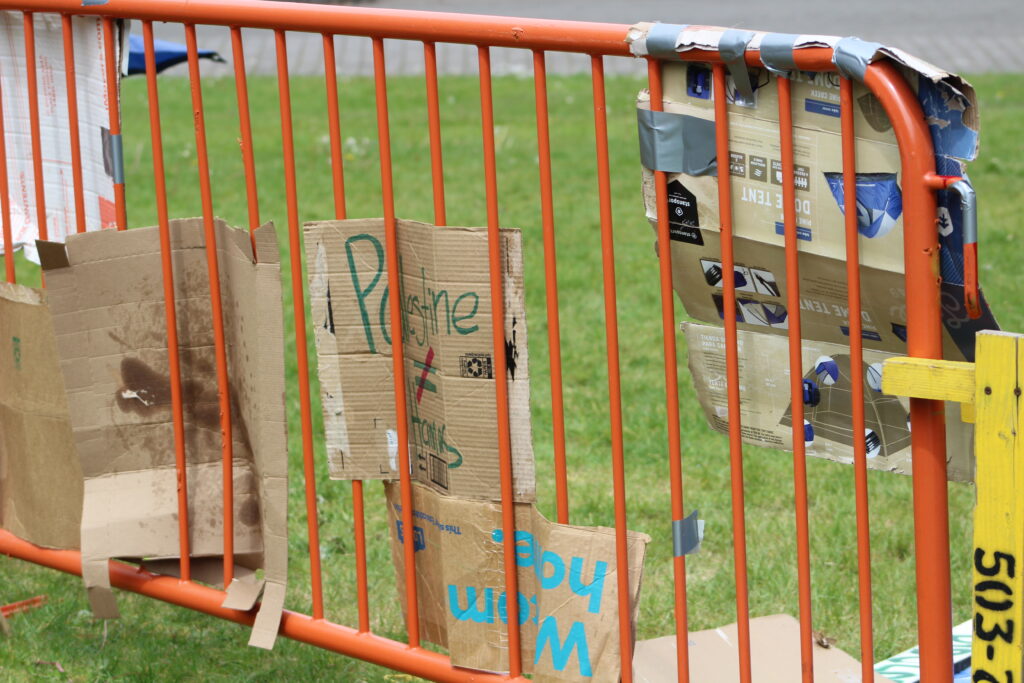On April 18 at Columbia University, police officers arrested more than 100 protesters calling for a ceasefire in Gaza. In the weeks following, students in Oregon undertook similar efforts, setting up encampments at Portland State University (PSU), Lewis & Clark, Reed, Oregon State University and University of Oregon.
Student organizers across Oregon and the United States have forged alliances and learned from one another’s experiences, demonstrations and negotiations. In Portland, students from LC, PSU and Reed have all set up their own encampments, while simultaneously organizing community activities and demonstrations. The PSU student protesters, with their central location downtown, have amassed support from the local Portland community.
PSU has garnered national attention, since it is now being recognized as one of a number of schools across the US whose student protesters have been arrested or detained. Students took over PSU’s Branford Price Millar Library on Monday, April 29, and on the morning of Thursday, May 2, Portland police cleared out the library. The vigor of the PSU protests have resulted in both recognition and retaliation. Student protesters at PSU have faced severe backlash, including counter-protests and police brutality. Several of the students who were arrested or detained faced arraignments the next day at the Multnomah County Justice Center. Fellow students and protesters showed their support both in and outside of the courtroom, with posters, food, and applause.
Early Monday morning, LC student protesters gathered in the Glade — the large circle of grass between the Frank Manor House and Pamplin Sports Center. Through rainy weather, the encampment firmly established itself throughout finals week with several tents, orange safety barriers, and cardboard and wooden signs detailing their demands.
Students were seen in the encampment wearing keffiyehs, which are headdresses that have traditionally been worn in The Middle East. While different-colored keffiyehs can represent different values, political affiliations or historical trade routes or landmarks, keffiyehs of all colors have become increasingly associated with Palestinian resistance fighters and activists. Many of the students organizing and interacting with the encampment wore blue and white keffiyehs.
During finals week, students likely walked past the demonstration and heard traditional Palestinian music playing in the Glade or engaged in various community events held at the encampment. Activities included poetry readings, community dialogues, poster and button making, graduation gown and cap decoration and candlelight vigils.
The student organizers of LC’s encampment make three demands. These demands were written on cardboard signs, posters and banners surrounding the encampment, and can also be found in a post, dated May 2, from their Students for Justice in Palestine (SJP), Palatine Hill Instagram account, @sjppalatinehill. The caption states that their previous account, @sojp24, was taken down.
Their Instagram account has served as a means for the student organizers to disseminate information, promote community events throughout the week, document their protests and detail their demands. The student organization’s demands were grouped into three categories, described on slides: “Speech,” “Disclose and Divest” and “Denounce.”
The first demand, entitled “Speech,” calls for an end to the “constant suppression of the conscientious speech of students.” The slide cites “attempts to prevent discussion of Palestine,” “the policing of the word ‘genocide’,” “the compliance and cooperation with institutions that seek to target peaceful campus events against the genocide in Gaza” and “the treatment of human rights activism as a ‘security threat’” as examples of the administration’s suppression of speech.
On the next slide, their second demand, under the headline of “Disclose and Divest,” demands “an immediate full disclosure and accounting of any endowment investments in organizations that do business with the present apartheid government in the settler-state of Israel, followed by a rapid divestment from these organizations by BDS (Boycott, Divest, Sanctions) guidelines.”
The following slide, entitled “Denounce,” outlines the group’s third demand.
“We demand that Lewis & Clark, as an institution, denounce the suppression of civil liberties going on at campuses across the U.S., and uphold the rights of students to materially support the causes of peace, justice and human dignity,” the slide states..
The student organizers’ demands, which were displayed on a large sign in front of the encampment all week and which have been detailed on social media since Monday, are directed at the LC administration and the Board of Trustees. Throughout last week, the students were in negotiations with the administration, during which they presented their demands and concerns.
On Tuesday, April 30, Vice President for Student Life and Dean of Students Evette Castillo Clark addressed the protest in an email sent to all undergraduate students. The email responded to two meetings between herself, President Holmes-Sullivan and “a few of the students who have been gathering in tents on the Glade.” At the first meeting on Monday, April 29, Evette wrote that she and Holmes-Sullivan “received the group’s priorities and were in agreement about their right to protest or demonstrate in a peaceful manner.” The second meeting, held in the Frank Manor House on Tuesday, April 30 had to do with the students’ questions and concerns regarding the school’s endowment.
“In a caring, thoughtful community like ours, we must balance freedom of expression with the need to maintain an educational environment where everyone feels safe and has a sense of belonging,” Castillo Clark said in the email. “Speech that targets any group is against the standards to which we must hold ourselves as a community of scholars. Practicing the skill of speaking and listening in a way that promotes collective engagement and learning is part of what we are here to do: learn from each other, talk through our differences and work toward mutual understanding.”
Castillo Clark did not issue a statement regarding the college’s stance on the nationwide movement advocating for a ceasefire in Gaza, nor did she explicitly address the student protesters’ demands for the college to protect free speech, disclose, divest and denounce.
“President Holmes-Sullivan spoke with the students, and reminded them of the endowment’s primary purpose, which is to maintain gifts from donors in a way that ensures the financial health of the college and supports essential operations, including funding student scholarships,” Castillo Clark said in the April 30 email. “The president committed to sharing the students’ concerns with those who make investment decisions and manage the endowment on behalf of the college. While any next steps in the process are still to be determined, I can provide an update to the student organizers of the encampment by the end of May.”
On Friday, May 3, Director of Public Relations Lois Leveen responded to The Mossy Log’s request for a statement on behalf of the college’s administration. The statement did not speak directly to the Israel-Hamas war or the encampment’s demands for disclosure, divestment and denunciation.
“As disturbing as it is to see other campuses racked by open and even violent polarization, we need to remember that those instances catching the news headlines don’t necessarily represent the reality on most campuses, including ours,” Leveen said via email. “This week, around this issue, administration, faculty, staff, and students are talking about deep and important concerns. We’re doing so on the Glade and in lots of other places and spaces. That is a good thing — although of course talking about how to respond to such immense global problems is also a challenging thing. We always want to be a community that engages thoughtfully around deep and important concerns.”
The Office of the President did not respond to the request for comment.
The student protesters at the pro-Palestine encampment declined to provide individual interviews in order to remain anonymous. In a conversation with the group on Friday, May 3, all students present shared the sentiment that no one individual could act as a leader or representative of the SJP, Palatine Hill group on the LC campus. The organizers, after emphasizing their focus on decentralizing their leadership and ensuring that their demonstrations and organization efforts remain nonhierarchical, shared the following statement directly with The Mossy Log.
“We, the community of the liberated zone at ‘Lewis & Clark College,’ stand with Palestine and condemn the college’s silence on the ongoing genocide in Gaza and the West Bank,” the demand statement said. “There are 34,000 counted among the dead in Gaza and likely 10,000 more unaccounted for. We have been in negotiations since Monday with the LC administration, and we remain disappointed with their lack of action — especially considering that all universities in Gaza have been destroyed by Israeli occupation forces. Our demands are the following:
- Lewis & Clark College is transparent about where its $306.4 million endowment is being invested, by Aug. 30, 2024.
- Lewis & Clark College will continuously disclose these investments as they are documented for release.
- Lewis & Clark College divests from all companies profiting from the Israeli apartheid and the occupation.
- Lewis & Clark College divests from all arms manufacturers.
- Lewis & Clark College releases a statement condemning the ongoing genocide in Palestine.
We must all remain committed to Palestinian liberation. This does not end with the school year. No one is free until we are all free.”
On Friday, May 3, the official move-out day for on-campus non-senior residents, the group intentionally ended their week-long encampment with a final community gathering event, during which student protesters helped break down the camp and set intentions for the upcoming months.
The SJP, Palatine Hill Instagram account shared that further courses of action would be discussed at the event, and that this was only just the beginning.
“Energy will be uplifting as we honor our community, other communities of solidarity, and most importantly, Palestine,” said the post. “Extra supplies and tents will be donated to the houseless community in Portland.”
On Saturday, May 4, student protesters staged a silent protest outside the Veterans Memorial Coliseum, where Lewis & Clark’s 151st Annual Commencement Ceremony took place. At the end of the graduation ceremony, during the senior choir’s closing song, a protester ran on stage and yelled out “Free Palestine.”
Though the first arrests at Columbia’s student demonstrations took place over two weeks ago, it is evident that students across the country are increasingly engaging in acts of solidarity with Palestinians, and it is not clear how long student protests will continue. Some schools are wrapping up their finals weeks, whereas others still have several weeks to go during which protests may continue.
Several institutions, such as Rutgers University in New Jersey, the University of California, Riverside and the University of Minnesota in Minneapolis have peacefully and successfully reached agreements with student protesters by making commitments to improve investment transparency, adjust study abroad programs and fund admissions for Palestinian students, among other demands. According to the Hindustan Times, Evergreen State College in Olympia, WA became the first university in the US to completely divest from Israel when student protesters and administration successfully negotiated an end to the encampment and the start of a plan for the college to begin divesting from “companies that profit from gross human rights violations and/or the occupation of Palestinian territories.”
Many of the protests staged on university grounds are gathering support from students and non-students alike. As demonstrations sweep the nation and call attention to what many label a genocide in Gaza, American civilians within and beyond the educational spheres are increasingly turning their eyes to the Israel-Hamas war, the extent to which their government is involved, and the role of protest in a highly globalized world.
Subscribe to the Mossy Log Newsletter
Stay up to date with the goings-on at Lewis & Clark! Get the top stories or your favorite section delivered to your inbox whenever we release a new issue.





Leave a Reply